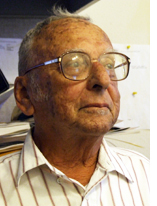Psalms, A Memoir by Hirsch Grunstein; Create Space; 403 pages; no price listed.
By Norman Manson

SAN DIEGO–This is, in a number of ways, a very unusual memoir of Holocaust survival. It is not a story of survival in death camps, nor of life on the run deep in the fields and woods of eastern Europe.
Rather, it portrays the recollections of a boy’s life under four years of Nazi occupation in Belgium – a life fraught with stress and anxiety, yet almost devoid of physical harm, at least for young Hirsch (or Henri as he was know in those years) Grunstein.
 In some ways the most amazing part of this story is Grunstein’s phenomenal memory, his vivid descriptions of his growing-up years, 65 to 70 years ago. And a section that highlights this phenomenon is his recall of reading the entire biblical book of Psalms, which made a sufficient impression on him that he made it his book’s title.
In some ways the most amazing part of this story is Grunstein’s phenomenal memory, his vivid descriptions of his growing-up years, 65 to 70 years ago. And a section that highlights this phenomenon is his recall of reading the entire biblical book of Psalms, which made a sufficient impression on him that he made it his book’s title.
While Belgium’s Jews certainly suffered under Nazi rule – 25,000 of the 60,00 who lived there were deported to Auschwitz and other death camps and few if any returned – the impression left by this book is that they underwent fewer of the horrors than their East European counterparts did and that, with the help of a few compassionate gentiles, a larger percentage were able to survive.
Grunstein suffered only one really excruciating moment in the course of his wartime odyssey, and what seemed to be a portent of utter foreboding quickly turned into a time of renewed hope. And, in the end, the immediate Grunstein family all survived and were reunited.
Originally from Poland, the Grunsteins immigrated to Belgium in 1930, and were quite well established in Antwerp’s flourishing diamond industry by the time the Wehrmacht invaded in May 1940. They first fled to France, but there was no haven there and they soon returned home, oddly enough with the encouragement of the conquering Nazis. At first, all seemed almost normal, but the Nazis gradually tightened their stranglehold, barring Jews from businesses, schools and much of the city.
In 1942, raids on the Jewish neighborhood were followed by deportations, ostensibly for work.
Finally, in September 1942, it was decided to place young Henri (he was 14) and his younger brother Sylvain with a gentile family in a small village between Antwerp and Brussels. Their hosts, Adrienne and Gaston, put Henri in a small upsteairs bedroom. And, for the next year and a half, Grunstein spent most of his days in hiding, peering out the window or reading from the small book of Psalms that his father had made him take along.
This segment is the most fascinating and provocative of the story – one can see why he titled the book “Psalms.” Amazingly, he recalls, in minute, precise detail, the impact the psalms had on him, bring back memories of his childhood in synagogue and school, and inspiring visions of various aspects of Judaism. The family was Orthodox, quite observant, and Henri tries to retain at least some semblance of Orthodoxy in this totally gentile environment. He even managed to fast on one Yom Kippur. And, when not reading the Psalms, he spends much of his time fanstsizing, gazing out the window and describing the scenes, and his fantasies.
This relatively placid existence came to a sudden, jolting end in the spring of 1944, when he (and others) were apprehended by the SS -his description of his capture is also very detailed and suspense-filled. And, for no more than a day, he appears to be doomed. However, he is rescued by the Belgian Judenrat (Jewish council) and spends the last months of the war in a home for children.
Not to minimize the fate of the 25,000 Belgian Jews sent to Auschwitz and other death camps, but this book seems to indicate that at least a significant number of Belgian gentiles hid and otherwise helped their country’s Jews. Relatively little has been written about the Holocaust in Belgium, and his story spotlights the Belgians’ role during that horrendous era. And Grunstein’s recollections of his wartime experiences are truly amazing in their precise, minute detail after almost 70 years.
For someone whose first language is not English, this memoir is quite well written, and the editing also is first-rate. For a somewhat unusual take on the Holocaust, this is a book well worth reading.
*
Manson is a freelance writer based in San Diego